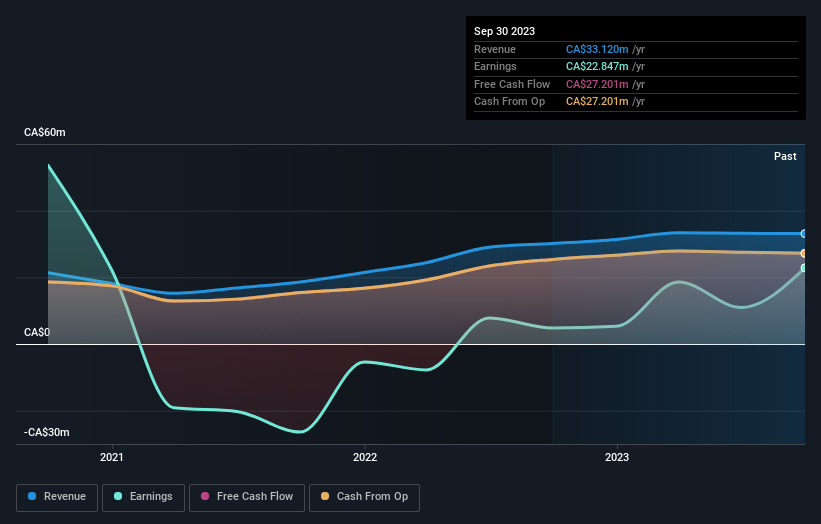Individual investors account for 82% of The Keg Royalties Income Fund's (TSE:KEG.UN) ownership, while institutions account for 15%
Key Insights
Significant control over Keg Royalties Income Fund by individual investors implies that the general public has more power to influence management and governance-related decisions
A total of 6 investors have a majority stake in the company with 18% ownership
If you want to know who really controls The Keg Royalties Income Fund (TSE:KEG.UN), then you'll have to look at the makeup of its share registry. And the group that holds the biggest piece of the pie are individual investors with 82% ownership. In other words, the group stands to gain the most (or lose the most) from their investment into the company.
Meanwhile, institutions make up 15% of the company’s shareholders. Large companies usually have institutions as shareholders, and we usually see insiders owning shares in smaller companies.
Let's take a closer look to see what the different types of shareholders can tell us about Keg Royalties Income Fund.
See our latest analysis for Keg Royalties Income Fund
What Does The Institutional Ownership Tell Us About Keg Royalties Income Fund?
Institutions typically measure themselves against a benchmark when reporting to their own investors, so they often become more enthusiastic about a stock once it's included in a major index. We would expect most companies to have some institutions on the register, especially if they are growing.
We can see that Keg Royalties Income Fund does have institutional investors; and they hold a good portion of the company's stock. This implies the analysts working for those institutions have looked at the stock and they like it. But just like anyone else, they could be wrong. It is not uncommon to see a big share price drop if two large institutional investors try to sell out of a stock at the same time. So it is worth checking the past earnings trajectory of Keg Royalties Income Fund, (below). Of course, keep in mind that there are other factors to consider, too.
Hedge funds don't have many shares in Keg Royalties Income Fund. Scotia Asset Management L.P. is currently the company's largest shareholder with 15% of shares outstanding. In comparison, the second and third largest shareholders hold about 2.2% and 0.2% of the stock.
A deeper look at our ownership data shows that the top 6 shareholders collectively hold less than half of the register, suggesting a large group of small holders where no single shareholder has a majority.
While studying institutional ownership for a company can add value to your research, it is also a good practice to research analyst recommendations to get a deeper understand of a stock's expected performance. We're not picking up on any analyst coverage of the stock at the moment, so the company is unlikely to be widely held.
Insider Ownership Of Keg Royalties Income Fund
The definition of an insider can differ slightly between different countries, but members of the board of directors always count. Company management run the business, but the CEO will answer to the board, even if he or she is a member of it.
Insider ownership is positive when it signals leadership are thinking like the true owners of the company. However, high insider ownership can also give immense power to a small group within the company. This can be negative in some circumstances.
Our information suggests that The Keg Royalties Income Fund insiders own under 1% of the company. It seems the board members have no more than CA$211k worth of shares in the CA$228m company. We generally like to see a board more invested. However it might be worth checking if those insiders have been buying.
General Public Ownership
The general public, mostly comprising of individual investors, collectively holds 82% of Keg Royalties Income Fund shares. This size of ownership gives investors from the general public some collective power. They can and probably do influence decisions on executive compensation, dividend policies and proposed business acquisitions.
Next Steps:
It's always worth thinking about the different groups who own shares in a company. But to understand Keg Royalties Income Fund better, we need to consider many other factors. Consider risks, for instance. Every company has them, and we've spotted 2 warning signs for Keg Royalties Income Fund you should know about.
Of course this may not be the best stock to buy. So take a peek at this free free list of interesting companies.
NB: Figures in this article are calculated using data from the last twelve months, which refer to the 12-month period ending on the last date of the month the financial statement is dated. This may not be consistent with full year annual report figures.
Have feedback on this article? Concerned about the content? Get in touch with us directly. Alternatively, email editorial-team (at) simplywallst.com.
This article by Simply Wall St is general in nature. We provide commentary based on historical data and analyst forecasts only using an unbiased methodology and our articles are not intended to be financial advice. It does not constitute a recommendation to buy or sell any stock, and does not take account of your objectives, or your financial situation. We aim to bring you long-term focused analysis driven by fundamental data. Note that our analysis may not factor in the latest price-sensitive company announcements or qualitative material. Simply Wall St has no position in any stocks mentioned.

 Yahoo Finance
Yahoo Finance 
